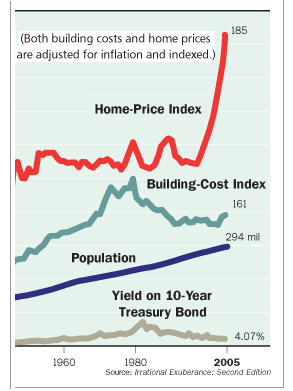

|
| weblog/wEssays | home | |
|
The Demographics Behind the Housing Market Decline (December 29, 2005)  The standard demographic explanation for a permanent housing boom--America's rising population
will fuel a housing boom for decades to come--misses the key demographic point:
the people with all the houses are dying off, and their Baby Boomer children already own
their own homes. And after the home-buying frenzy of the past five years, many of the
Boomer's offspring already own homes or condos, too.
The standard demographic explanation for a permanent housing boom--America's rising population
will fuel a housing boom for decades to come--misses the key demographic point:
the people with all the houses are dying off, and their Baby Boomer children already own
their own homes. And after the home-buying frenzy of the past five years, many of the
Boomer's offspring already own homes or condos, too.
So who's going to buy all the millions of homes which will be coming on the market as the World War Two generation moves into care homes or passes on? If Boomers move into Mom and Dad's house, then they'll have to sell their own house. If they have more than one child, then dumping the house is necessary to avoid squabbles about who gets what. And even if Junior moves into Grandma's home, then he has to unload his condo or starter house in order to fund the inevitable remodeling expenses. According to the standard line, new citizens will step up by the millions to buy all these surplus houses. But that theory rests on one shaky supposition--that recent immigrants, statistically the poorest-paid workers in America, can gather up the financial wherewithal to buy a horrendously expensive house. That's just not financially possible, unless housing prices come down from the stratosphere to sea level again. What's sea level? The most widely used gauge is the long-term relationship between house prices and rents. According to that measure, housing will have to drop by 30% - 50% to return to historical levels. Put another way: any housing boom rests on demand exceeding supply. But the demographics suggest the opposite: an overhang of excess supply which will last for a decade or longer. And we must also consider the inevitable overbuilding which marks the top of any housing boom: the number of condos and homes being built already exceeds demand, as proven by skyrocketing inventories (see yesterday's entry). Some foresee second homes as housing's long-term salvation; the argument is stated succinctly in this article. But the major supposition behind this argument is a steadily rising economy and housing market. Are you really going to buy that condo in Snowmass if you think it's going to lose $100,000 in value over the next few years? Unlikely. Furthermore, the writer fails to consider the fact that desirable second-home markets are now as expensive as primary home markets. While people have traditionally purchased a cabin or retirement home in advance of their actual retirement, that is becoming a luxury affordable only to the nation's top wage earners. And exactly what happens when Mr. and Mrs. Upper-Middle-Class do finally move to their luxurious chalet? They promptly sell their primary residence, flooding the market with superflous houses. If you want to make your own statistical analysis, a good place to start is the U.S. Census Bureau website on housing. * * * copyright © 2005 Charles Hugh Smith. All rights reserved in all media. I would be honored if you linked this wEssay to your site, or printed a copy for your own use. * * * |
||
| weblog/wEssays | home |